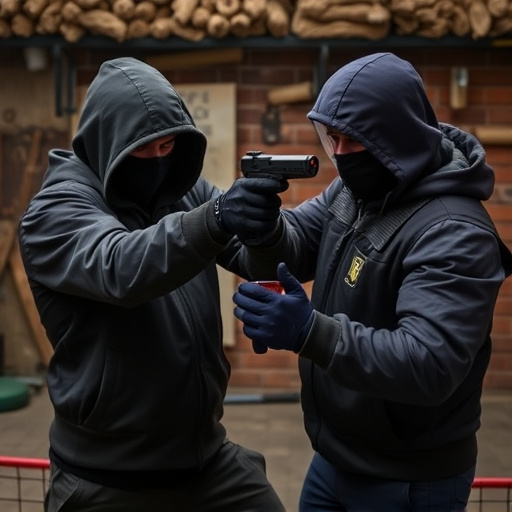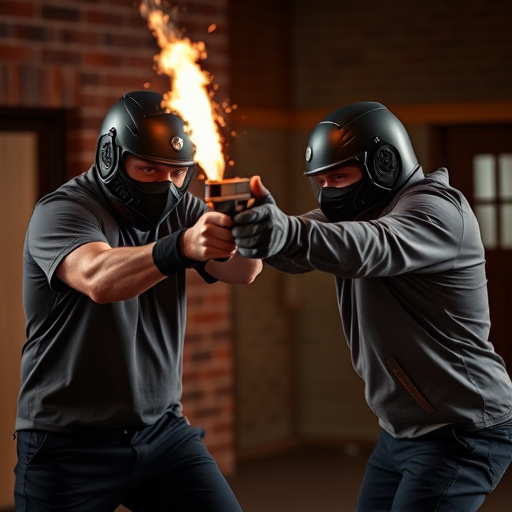Understanding state laws regulating taser ownership is crucial for prospective buyers in the U.S., as each state has unique permit requirements, storage guidelines, and responsible use rules. While some states allow unrestricted ownership, others mandate licenses or specific permits. Safe storage, achieved through secure locking mechanisms and designated locations, is vital to prevent accidental discharge or misuse. Prospective owners must stay informed about local legislation, meet age criteria, pass background checks, and ensure proper storage practices like using locked safes or hidden compartments to keep stun guns out of reach of children and unauthorized individuals. Regular maintenance and training on device functionality are also essential for reliable use when needed.
In today’s world, the civilian ownership of tasers has gained significant attention. Understanding state laws regulating taser ownership is crucial for ensuring public safety and responsible usage. This article delves into the intricacies of acquiring a stun gun, legal requirements for purchase and registration, safe storage practices to prevent misuse, and potential consequences of irresponsible ownership. By exploring these key aspects, folks can navigate the legal landscape and make informed decisions regarding stun gun ownership. Remember that proper knowledge and responsible handling are paramount in terms of civilian taser ownership.
- Understanding State Laws Regulating Taser Ownership
- Eligibility Criteria for Acquiring a Stun Gun
- Legal Requirements for Purchase and Registration
- Safe Storage Practices to Prevent Misuse
- Potential Consequences of Irresponsible Ownership
Understanding State Laws Regulating Taser Ownership

Understanding State Laws Regulating Taser Ownership
Each state in the U.S. has its own set of regulations regarding civilian taser ownership, making it crucial for prospective buyers to familiarize themselves with local laws before purchasing one. These rules cover various aspects, from permit requirements to storage guidelines, ensuring safe and responsible use. Some states allow citizens to carry stun guns without a license, while others mandate obtaining a concealed weapons permit or even a permit specifically for stun devices.
Proper storage is an integral part of these regulations, often mandating secure locking mechanisms and specific locations away from reach of unauthorized individuals. Learning how to store stun guns safely not only complies with state laws but also promotes responsible ownership, preventing accidental discharge or misuse. Always check the local legislation to stay informed about your rights and responsibilities as a civilian taser owner.
Eligibility Criteria for Acquiring a Stun Gun

In most states, individuals looking to acquire a stun gun, or tactical electronic control device (ECD), must meet specific eligibility criteria. These requirements often include being at least 18 years old and of sound mind, as well as passing a background check. Some states also mandate completion of a safety training course before purchasing and using the device. This ensures that owners understand how to deploy and store stun guns safely, minimizing potential risks to themselves and others.
Stun gun storage is a crucial aspect of responsible ownership. Individuals must secure their devices in a locked case or safe, out of reach of unauthorized individuals. It’s recommended to keep them in a discrete location within your home, away from children and curious visitors. Additionally, regular maintenance and familiarity with the device’s functionality are essential to guarantee its reliability when needed.
Legal Requirements for Purchase and Registration

Safe Storage Practices to Prevent Misuse

Stun guns, or Tasers, require careful and responsible storage to prevent unauthorized access and potential misuse. Many states have specific laws regarding civilian ownership and storage of stun devices, emphasizing safe handling practices. The first step in ensuring safety is choosing a secure location for storage. This could be a locked drawer or cabinet, preferably high up and out of reach of children or curious individuals. It’s essential to keep the device away from common areas where it might be easily accessed or left unattended.
Additionally, owners should consider implementing additional security measures like locking cases, using biometric locks, or even installing home security systems that alert you if someone tries to access a secured area containing your stun gun. Regularly reviewing and updating these storage practices is vital, especially when new laws or guidelines are introduced, ensuring that your storage methods always meet or exceed legal requirements for safe civilian Taser ownership.
Potential Consequences of Irresponsible Ownership

Irresponsible ownership of stun guns, or Tasers, can lead to severe consequences for both the owner and others around them. Unregulated use of these devices can result in accidental discharges, causing harm or even death, especially if mishandled or stored improperly. In many states, civilian ownership of Tasers is legal with certain restrictions, but it’s crucial to understand that these powerful tools carry significant responsibilities.
Proper storage of stun guns is an essential step in ensuring their safe use. Owners should invest in secure cases designed for Tasers and keep them out of reach of children and unauthorized individuals. How to store stun guns safely includes locating them in a locked drawer or cabinet, away from curious hands. Additionally, regular training on the device’s functionality and safety protocols can help prevent accidental activations and ensure users know how to respond in various situations.
Understanding state laws regarding taser ownership is crucial before considering acquiring one. Each state has its own eligibility criteria, legal requirements for purchase and registration, and guidelines on safe storage practices to prevent misuse. By adhering to these regulations, responsible owners can ensure their stun guns are stored safely and only used in accordance with the law. Remember that irresponsibility can lead to serious consequences, so educate yourself thoroughly before making a decision to own a taser.
